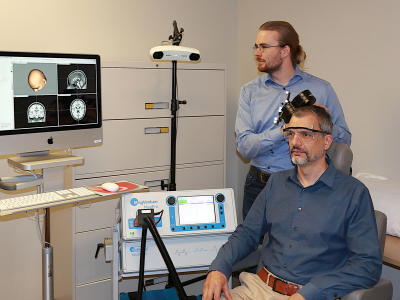
Brain stimulation is a rapidly expanding area of research and clinical practice. It enables noninvasive modulation of brain circuits to understand how the brain works. Clinical interventions using brain stimulation are an alternative or a complement to pharmacotherapy and psychotherapy.
Duke has a long tradition of clinical care, research and education in the area of brain stimulation. The Duke Electroconvulsive Therapy Clinic provides cutting-edge clinical care, and the Brain Stimulation Research Center offers brain stimulation research services for members of the Duke community.
A range of brain stimulation techniques are developed and utilized at Duke, including:
- Transcranial magnetic stimulation (TMS)
- Transcranial direct current stimulation (tDCS)
- Transcranial alternating current stimulation (tACS)
- Transcutaneous vagus nerve stimulation (tVNS)
- Electroconvulsive therapy (ECT)
- Deep brain stimulation (DBS)
- Neurofeedback
Continuing Medical Education Opportunities
The Department of Psychiatry & Behavioral Sciences offers two continuing medical education fellowships:
- Transcranial Magnetic Stimulation (TMS) Visiting Fellowship. For more information, contact Marisa Spurrell (marisa.spurrell@duke.edu).
- Electroconvulsive Therapy (ECT) Visiting Fellowship. For more information, contact Marisa Spurrell (marisa.spurrell@duke.edu).
Faculty
- R. Alison Adcock, MD, PhD (visit lab website)
- Jeffrey Browndyke, PhD
- Simon Davis, PhD (visit lab website)
- Kathryn Dickerson, PhD
- Kafui Dzirasa, MD, PhD (visit lab website)
- Jacob Feigal, MD
- Tommy Fu, MD
- Stefan Goetz, PhD (visit lab website)
- Tonisha Kearney-Ramos, PhD
- Andrada Neacsiu, PhD (visit lab website)
- Angel Peterchev, PhD (visit lab website)
- Gregory Sahlem, MD
- Jonathan Young, MD
Click on a faculty member’s name to view their profile, including their grants and publications.